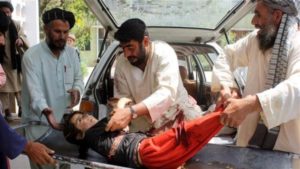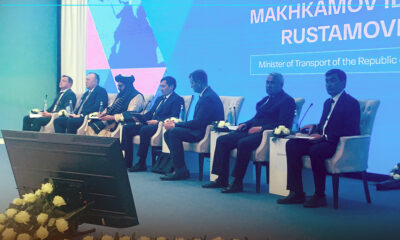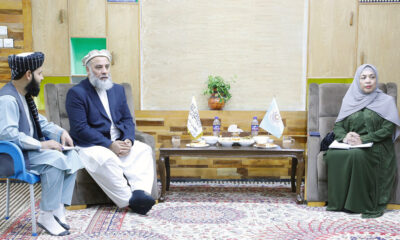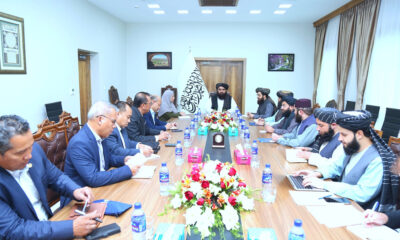Latest News
UNAMA Report Shows 23 Percent Decrease in Civilian Casualties
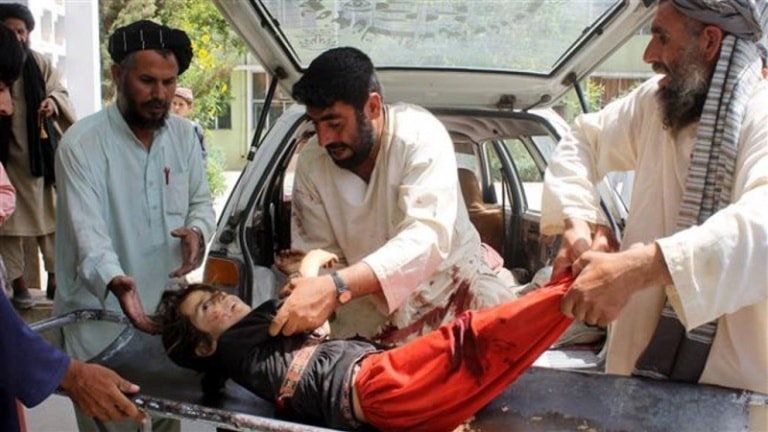
The U.N. Assistance Mission in Afghanistan (UNAMA) says in a report that the number of civilian casualties from the Afghan conflicts has a 23 percent decrease compared to the same period last year.
In the first quarter of 2019, the UNAMA continued to document high levels of harm to civilians from the armed conflict. From 1 January to 31 March 2019, UNAMA documented 1,773 civilian casualties (581 deaths and 1,192 injured), including 582 child casualties (150 deaths and 432 injured), the report says.
This represents a 23 percent decrease in overall civilian casualties as compared to the same period last year and is the lowest for a first quarter since 2013, the report adds.
The overall reduction of civilian casualties was driven by a decrease in civilian casualties by suicide improvised explosive device (IED) attacks, the report notes.
UNAMA notes the particularly harsh winter conditions during the first three months of the year, which may have contributed to this trend, the report underscores.
It is unclear whether the decrease in civilian casualties was influenced by any measures taken by parties to the conflict to better protect civilians, or by the ongoing talks between parties to the conflict, the report says.
UNAMA says that the mission remains very concerned by the continued targeting of civilians and increase in civilian casualties from the use of non-suicide IEDs by Anti-Government Elements, as well as significant increases in civilian casualties from aerial and search operations, which drove an overall increase in civilian casualties by Pro-Government Forces.
Civilian deaths attributed to Pro-Government Forces surpassed those attributed to Anti-Government Elements during the first quarter of 2019, the report further says.
Between 1 January and 31 March 2019, UNAMA attributed 608 civilian casualties (305 deaths and 303 injured) to Pro-Government Forces, representing a 39 percent increase from the same period last year.
UNAMA notes with concern that Pro-Government Forces were responsible for more civilian deaths than Anti-Government Elements during the first quarter of 2019. UNAMA attributed 17 percent of civilian casualties to the Afghan national security forces, 13 percent to international military forces, two percent to pro-Government armed groups, and two percent to multiple Pro-Government Forces.
Between 1 January and 31 March 2019, UNAMA recorded 18 incidents that impacted education, 4 12 of which were attributed to Anti-Government Elements, four to Pro-Government Forces, and two jointly to Anti-Government Elements and Pro-Government Forces. Four of these incidents involved attacks by Taliban targeting girls’ schools in Farah province, mostly in areas under their control, including setting the school buildings and equipment on fire. While no casualties were recorded, the attacks spread fear among the students and their families and led to school closures, affecting education for almost 3000 girls.
During the first three months of 2019, Anti-Government Elements remained responsible for the majority of civilian casualties, causing 963 civilian casualties (227 deaths and 736 injured), representing a 36 percent decrease as compared to the same time period in 2018, the report adds.
According to the report, UNAMA attributed 39 percent of civilian casualties to Taliban, 12 percent to Daesh and three percent to unidentified Anti-Government Elements.
UNAMA remains seriously concerned about Anti-Government Element attacks that deliberately target civilians, including the civilian government administration.

Latest News
Afghanistan’s problems caused more damage to Pakistan than 3 wars with India: Durrani

Islamabad’s special envoy for Afghanistan Asif Durrani said on Wednesday that Pakistan has suffered more due to Afghanistan’s internal situation than Pakistan has suffered in three wars with India in terms of blood spilt and finances drained.
Durrani said at a one-day International Conference titled “Pakistan in the Emerging Geopolitical Landscape”, which was organized by the Institute of Strategic Studies Islamabad (ISSI) and the German Friedrich Ebert Stiftung (FES), that over 80,000 Pakistanis died in the two decades of the War on Terror and that his country was still counting its dead and injured.
“After the withdrawal of NATO forces, it was hoped that peace in Afghanistan would bring peace to the region. However, such expectations were short-lived,” he said.
He also stated that attacks by the Tehreek-e-Taliban Pakistan (TTP) militant group on Pakistan’s border areas increased by 65 percent, while suicide attacks increased by 500 percent.
“The TTP’s enhanced attacks on Pakistan while using Afghan soil have been a serious concern for Pakistan. Another worrying aspect is the participation of Afghan nationals in these attacks,” he said.
Durrani also said Pakistan had suffered geopolitically since the Soviet Union invaded the neighboring country.
“The post-9/11 world order has negatively impacted Pakistan. Apart from losing 80,000 citizens’ lives, including 8,000 law enforcement agency personnel, the country’s economic opportunity cost is estimated at $150 billion,” Durrani said.
Talking about the future outlook for Pakistan in the regional context, Durrani said that while “our eastern neighbor is likely to continue with its anti-Pakistan pursuits, the western border poses an avoidable irritant in the short to medium term.”
However, he said Pakistan can overcome its difficulties with Afghanistan, including the TTP challenge.
Latest News
Afghanistan now a ‘nexus for diplomatic endeavors’, says IEA

In the wake of dozens of meetings between high-ranking Islamic Emirate officials and visiting officials from foreign countries, and other diplomatic advances, the IEA said on Thursday that in the current geopolitical landscape, Kabul now “serves as a nexus for diplomatic endeavors and political deliberations pertaining to global affairs”.
In a series of posts on X, the IEA’s spokesman Zabihullah Mujahid said diplomatic missions and political delegations from various nations, including Russia, Malaysia, Kazakhstan, Turkmenistan, the European Union, and others, “are evident in the capital, highlighting its strategic importance in fostering Islamic cooperation”.
He said: “Recently, the honorable Minister of Transport of the Islamic Emirate, Mr. Hamidullah Akhundzada, led a significant delegation to Termez, Uzbekistan, for essential discussions aimed at enhancing bilateral relations.
“These discussions encompass a wide range of topics, from trade facilitation to security assurances, indicating a focused effort by the Islamic Emirate to strengthen and broaden its international engagements, thereby ensuring sustained development and stability.
“These initiatives, characterized by diligence and effectiveness, underscore Afghanistan’s enduring commitment to diplomatic engagement and its pivotal role in regional and global affairs,” he said.
Mujahid added that these initiatives “also emphasize the vital connection between diplomatic efforts and economic prosperity, promising favorable outcomes for Afghanistan’s socio-economic landscape.”
He pointed out that despite ongoing challenges, Afghanistan “remains steadfast in its pursuit of prosperity and resilience, defying pessimistic projections and charting a course towards political and economic renewal.”
He said: “Continued efforts are essential to fostering inclusive growth and impactful initiatives, thus advancing Afghanistan’s journey towards sustainable development and increased influence on the global stage.”
Latest News
Mullah Baradar discusses creation of railway with Kazakh deputy PM

Mullah Abdul Ghani Baradar, deputy prime minister for economic affairs has met with Erik Zhumangarin, the Deputy Prime Minister of Kazakhstan, and discussed the establishment of a railway network from Kazakhstan to Pakistan through Turkmenistan and Afghanistan, the deputy PM’s office said in a statement.
During the meeting, Baradar emphasized the need to sign agreements to solve the banking problems of traders from both countries, the creation of Afghan-Kazakh joint companies, and the facilitation of visas for Afghan traders.
According to the statement, the Deputy Prime Minister of Kazakhstan said that the Kazakh government intends to establish a joint chamber of industry and commerce and a joint trade and labor group between the two countries, and is ready to cooperate with Afghanistan in the sectors of e-governance, industry, higher education, education, health, and banking.
-

 Sport5 days ago
Sport5 days agoAfghanistan Champions League kicks off with grand opening ceremony
-

 Latest News4 days ago
Latest News4 days agoPakistan’s frontiers minister stresses ‘dignified’ return of Afghan refugees
-

 Latest News5 days ago
Latest News5 days agoMore than 800 Afghan refugees deported from Pakistan in two days
-

 Regional3 days ago
Regional3 days agoIranian president lands in Pakistan for three-day visit to mend ties
-

 Climate Change4 days ago
Climate Change4 days agoMassive river flooding expected in China, threatening millions
-

 Latest News4 days ago
Latest News4 days agoChinese keen to invest in Panjshir-Kabul water conduit project
-

 World4 days ago
World4 days agoTwo Japan navy helicopters crash, one body found, 7 missing
-

 Latest News2 days ago
Latest News2 days agoRashid Khan named AWCC’s brand ambassador

